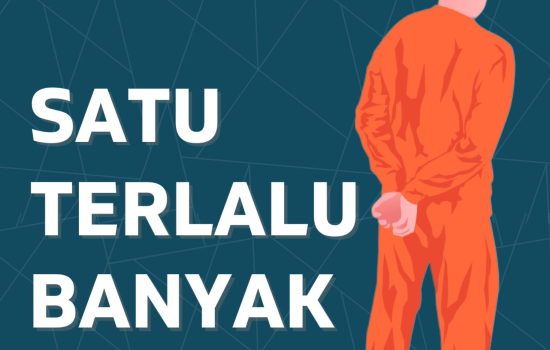Every year, the ICJR issues a report on the situation of death row in Indonesia. This report is crucial this year because it coincides with forming derivative rules from the new Criminal Code. This regulation derived from the new Criminal Code will change the death penalty situation in Indonesia. The implementing regulation will describe in more detail how the Indonesian government’s commitment to criticism and the democratic process has resulted in the term “Indonesian way” in regulating the death penalty as a result of conflicts between groups that are in support of and against the death penalty.
The Indonesian government has repeatedly conveyed this “Indonesian way.” In the Human Rights Session organized by the United Nations in Geneva on November 9, 2022, the Indonesian delegation, represented by the Minister of Law and Human Rights, Yasonna Laoly, delivered a presentation on the provisions of the new Criminal Code, which regulates the death penalty as a last resort. In addition, the death penalty can be commuted if the convict behaves well during his/her ten years of probation.
In the debate and discussion in the courtroom of Commission III of the House of Representatives of the Republic of Indonesia related to the Criminal Code, the “Indonesian way” in question was then narrowed down to a new mechanism in which the death penalty will automatically be imposed with probation period; this was following the removal of the word “may” in the provisions of Article 100 of the Criminal Code, which previously gave judges the authority to choose whether to impose the death penalty with or without probation. This is also in line with the explanation of Article 98 of the new Criminal Code, which states that “the death penalty is imposed with a probation period. Within the probation period, the convict is expected to improve him/herself so that the death penalty does not need to be carried out and can be replaced with life imprisonment.”
As a further consequence, that will activate the provisions of Article 1 paragraph (2) of the current Criminal Code and Article 3 paragraph (1) of the new Criminal Code; one of the main principles of criminal law is “in favor reo,” meaning that if the law is changed after the act has been committed, then the suspect is subject to provisions favorable to him.
Thus, based on the principle of criminal law, if a law changes after a criminal act has been committed, either the old or the new law can be applied to the perpetrator, the more mitigating provisions must be chosen. In his book, which was republished in 1995, R. Soesilo further explained that “more mitigating,” including in the context of leniency, refers to parts/elements of criminal events, types of offenses (whether it is a complaint offense), the guilt of the accused, and so on. The death penalty provisions in the new Criminal Code are more mitigating for defendants compared to the old Criminal Code because the death penalty in the new Criminal Code is no longer categorized as a main punishment but a special punishment.
The ICJR report will present death row inmates who are currently waiting for execution, some of whom have been waiting for more than 10 years, longer than the probation period stipulated in the new Criminal Code. The physical, environmental, and psychological conditions they have been living in are also not easy and must be considered in the mechanism of future changes to punishment.
This ICJR death penalty report focuses on the above issues, highlighting that the commitment upheld by the Indonesian government must be manifested in a more detailed mechanism, especially by adhering to the main principle agreed upon by the drafter of the law in the new Criminal Code, which is that the change to the death penalty is inevitably a mandate in the Criminal Code.
Finally, I would also like to thank the parties who contributed to the writing of this report, especially the team of ICJR researchers led by Iftitahsari and Adhigama Andre Budiman, along with Wahyu Aji Ramadhan, Asry Masfufah Alkazahfa, Angger Wahyu Kusuma, and Patricia Dean Maycita Pinasti. We want to thank the Director General of Corrections of the Ministry of Law and Human Rights, the Media, Civil Society Organizations, and those who assisted in processing and providing this data.
For a just and civilized Indonesia, happy reading.
Click here to access the document.




